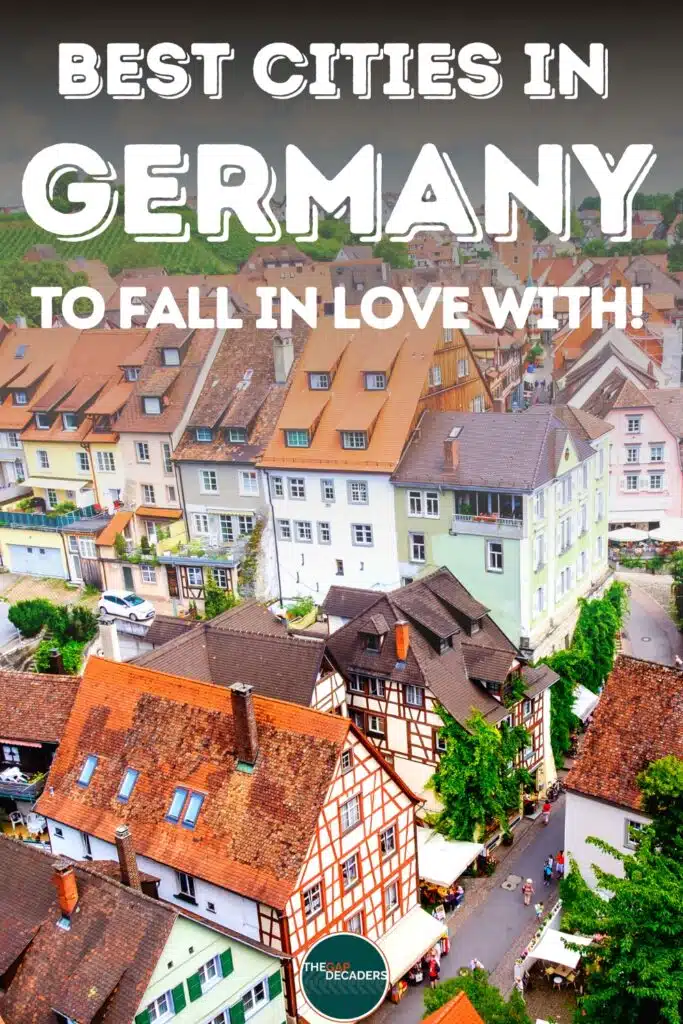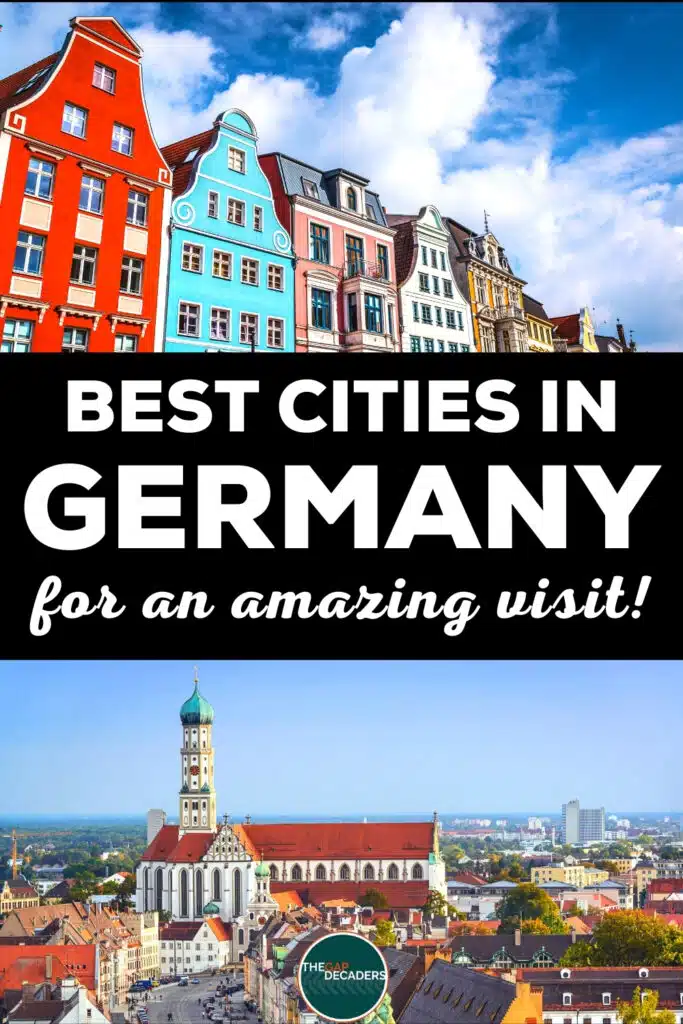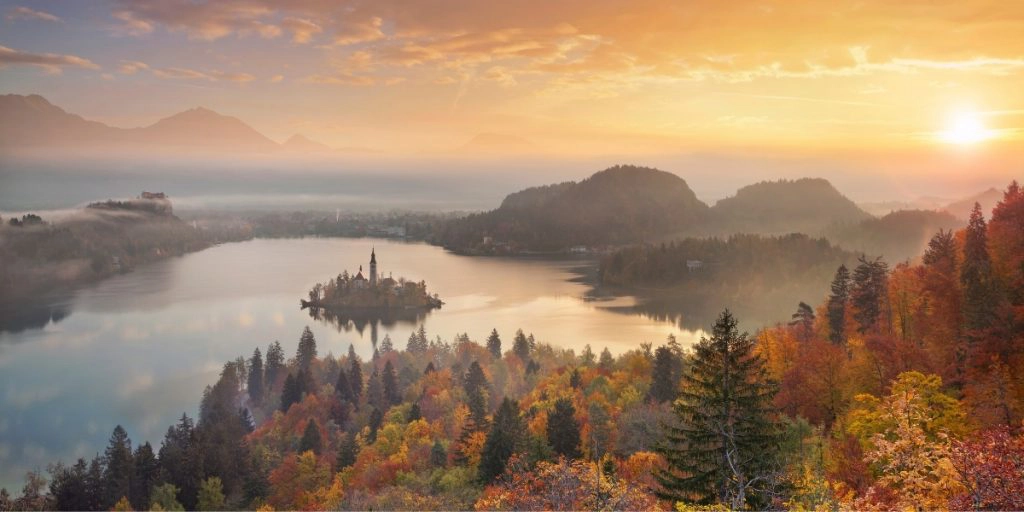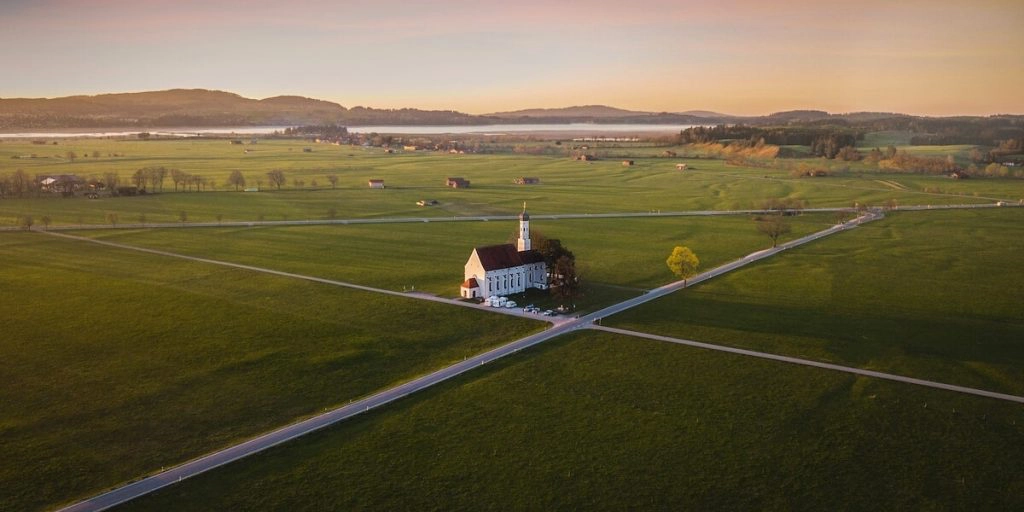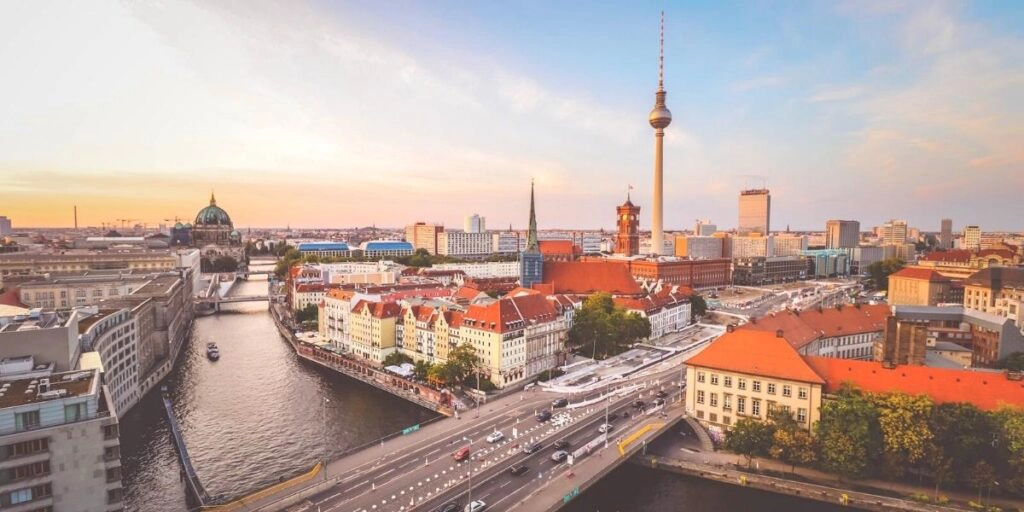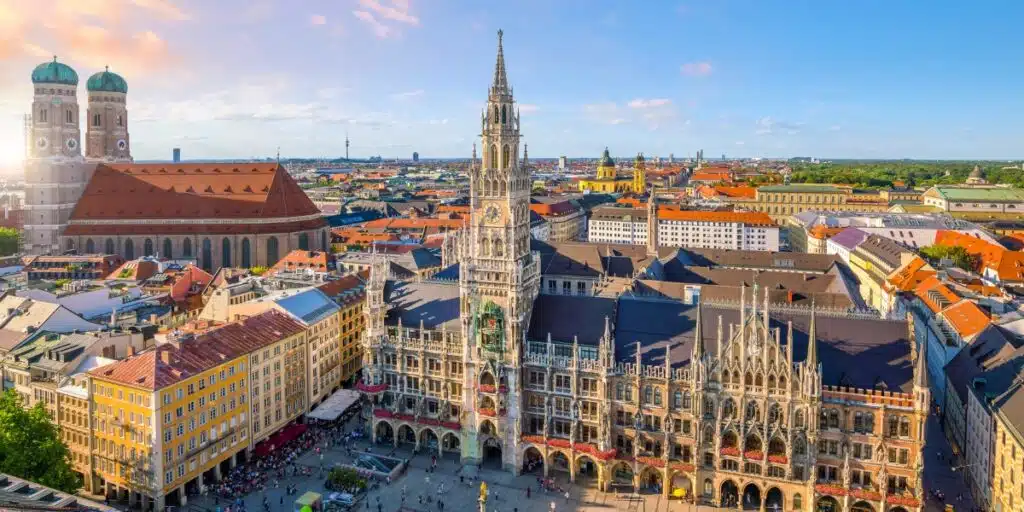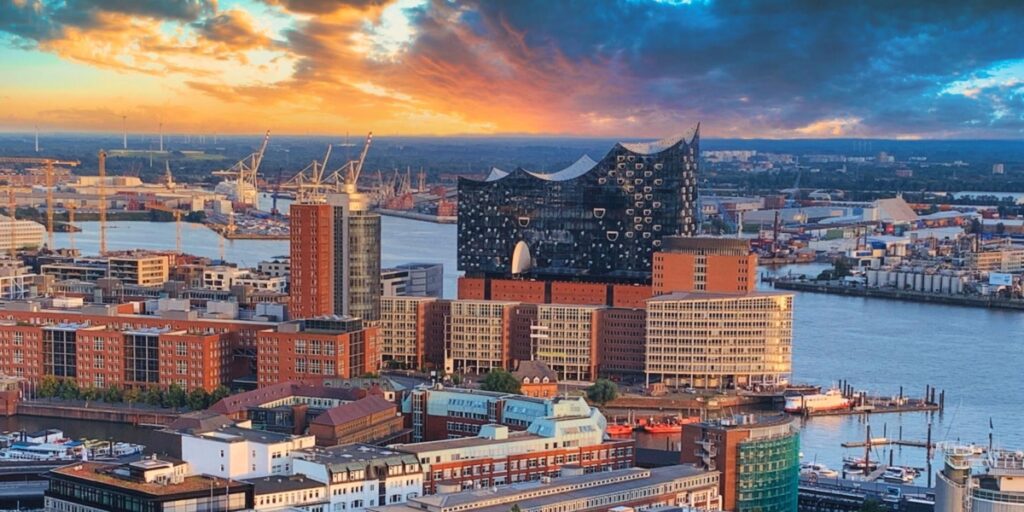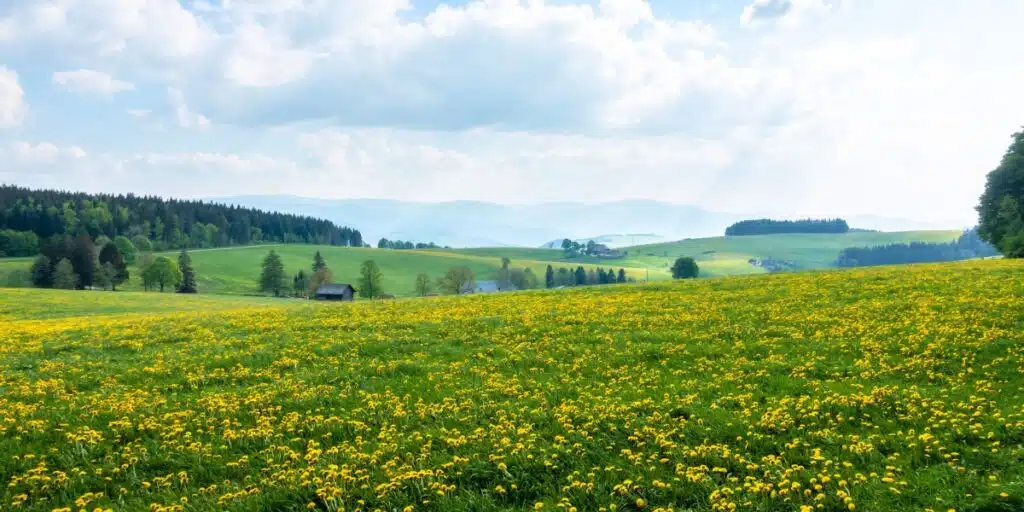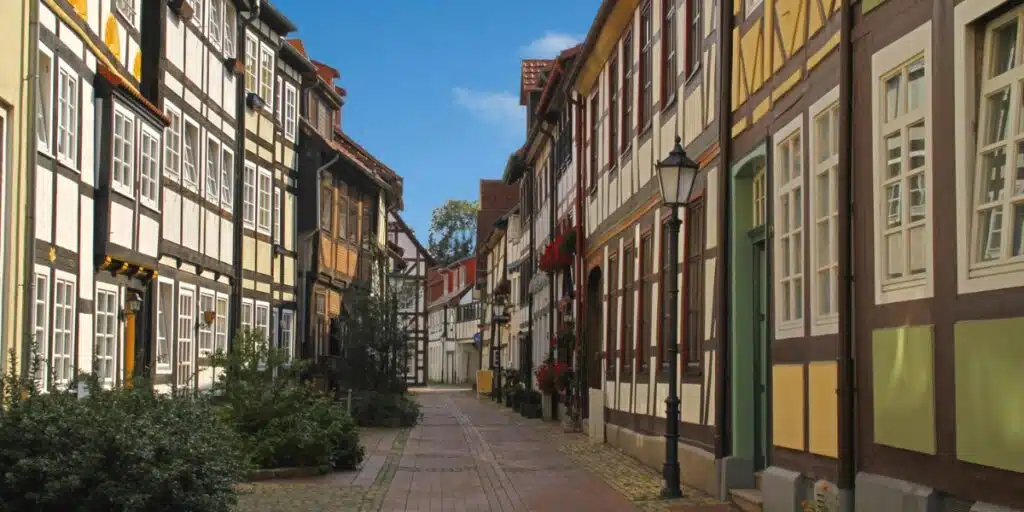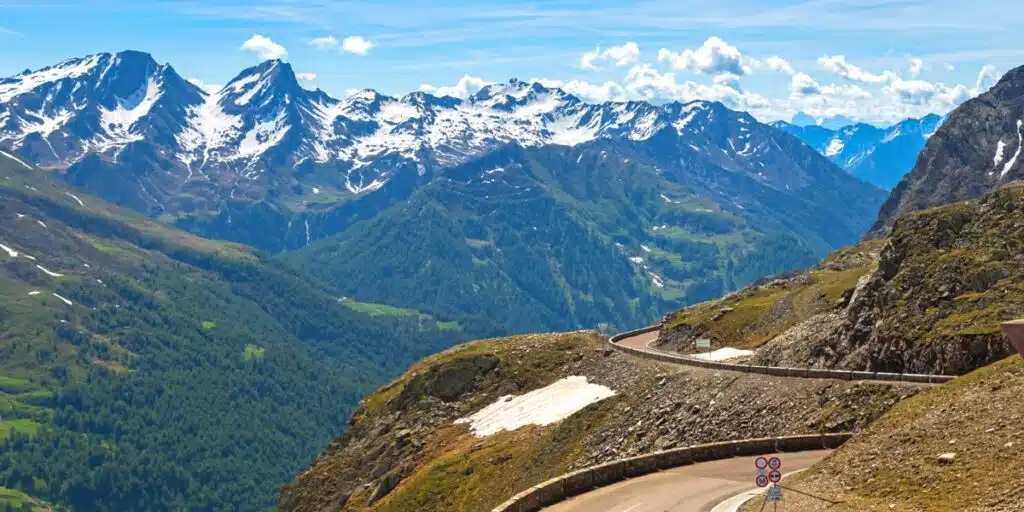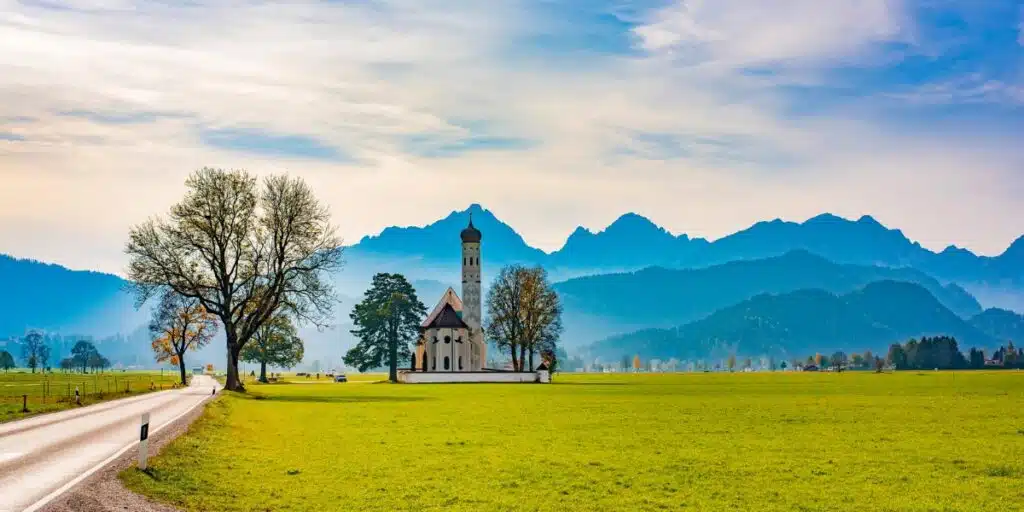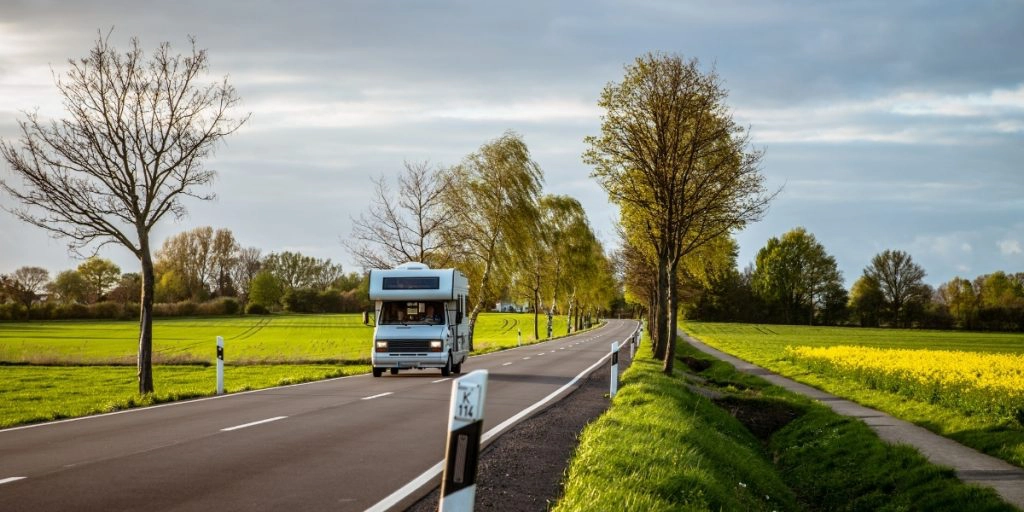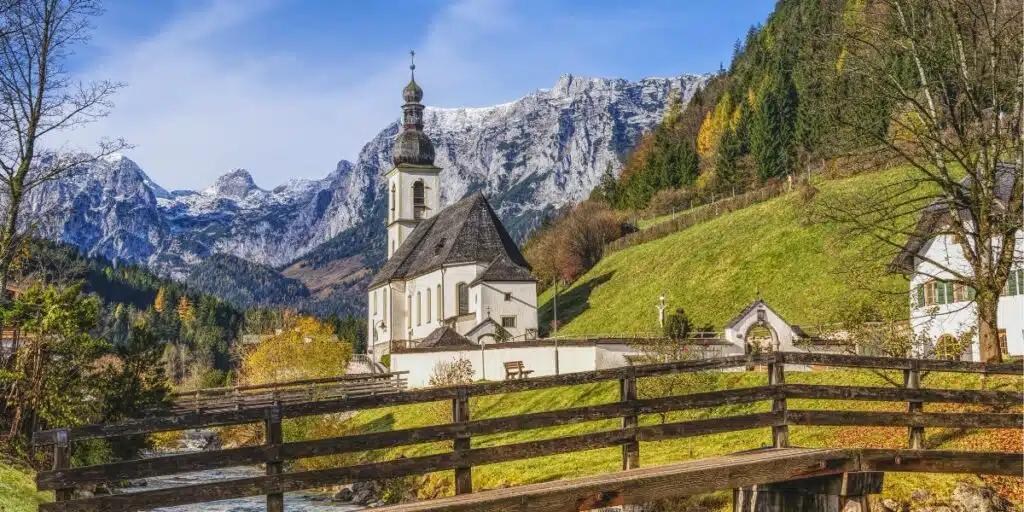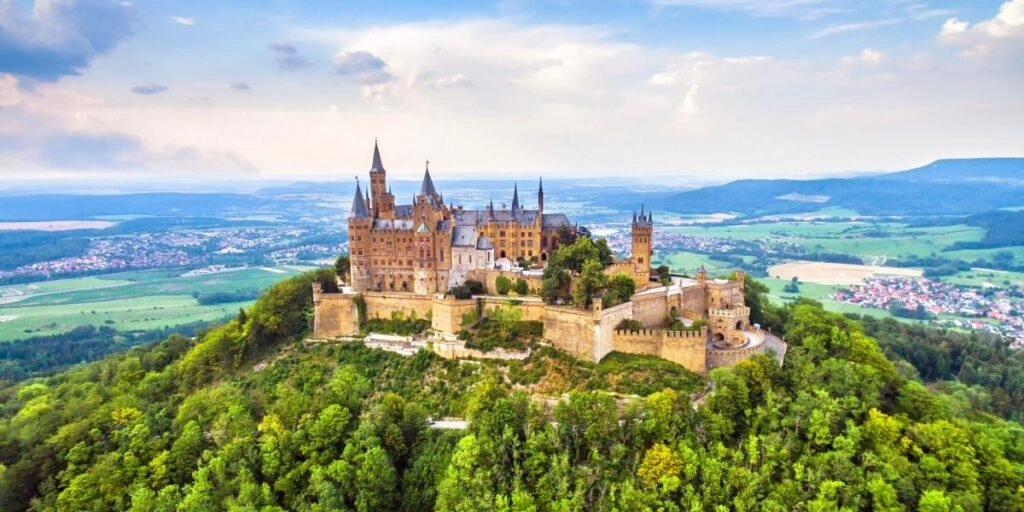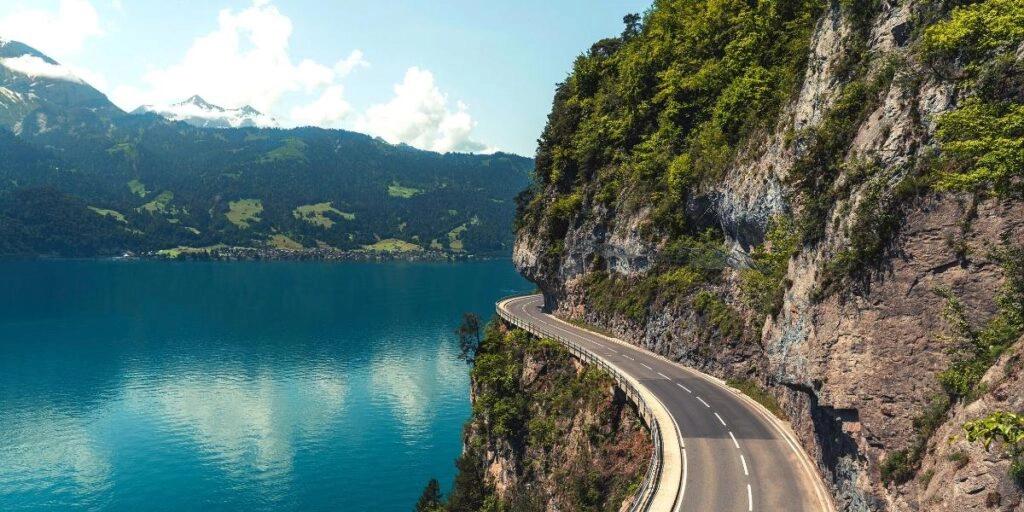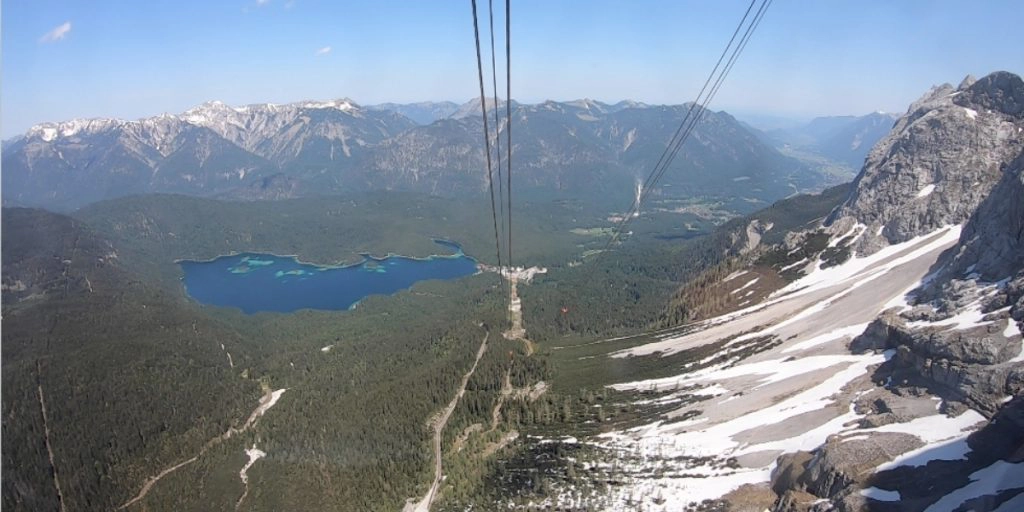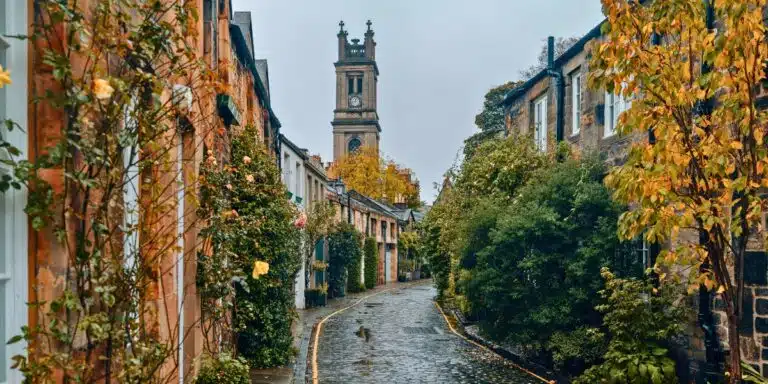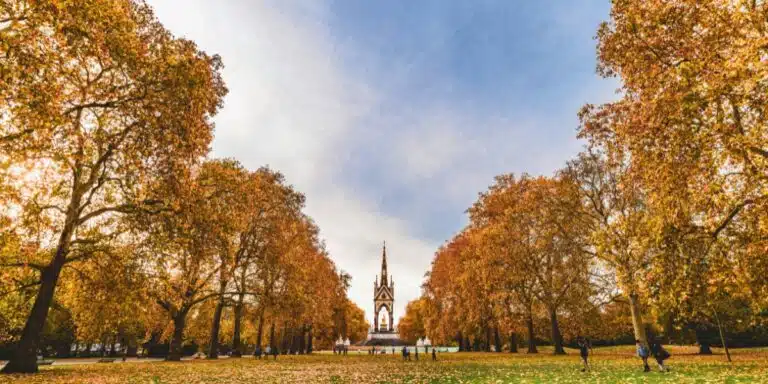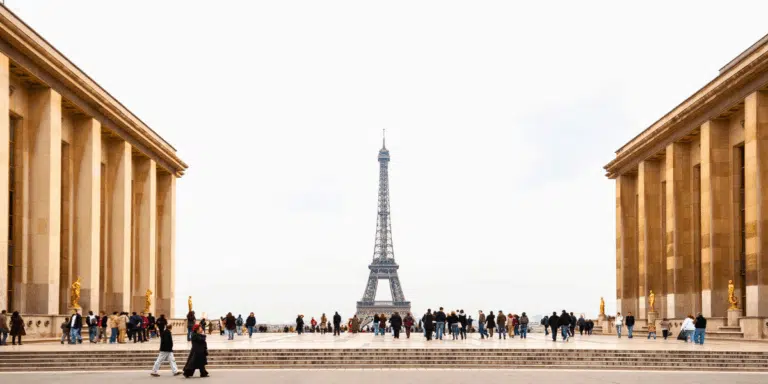This post may contain affiliate links, from which we earn an income. Click here to read our affiliate policy.
Deutschland isn’t just about bratwurst and beer, despite them being two fantastic reasons to visit. It is also home to stunning Bavarian towns and some of the most beautiful cities in Germany you could ever hope to explore.
Each corner of this Central European country is dotted with architectural marvels, historical wonders, and postcard-perfect scenery that’ll give the overrated landmarks in Europe a run for their money.
We’re about to take a virtual tour of the most beautiful cities in Germany to visit, each one a unique blend of old-world charm and modern sophistication, so get ready to plan your trip to one of Europe’s most diverse countries!
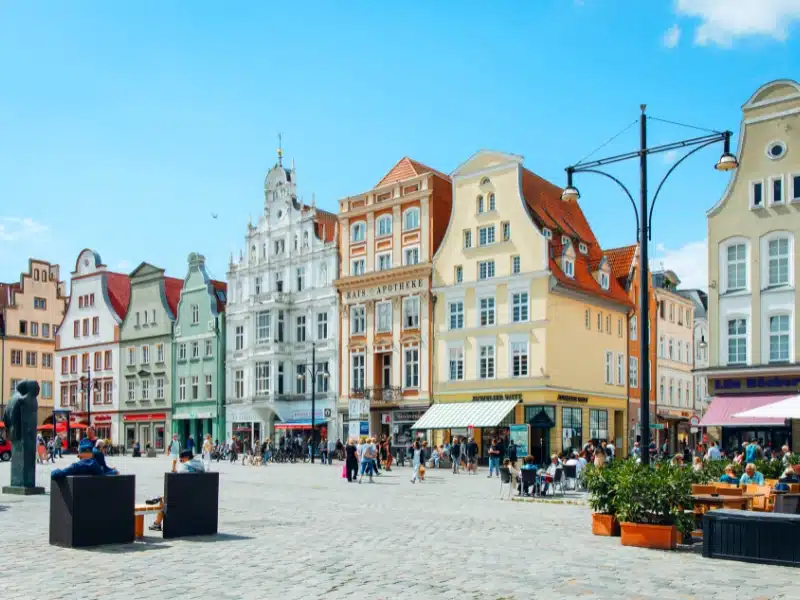
Germany Trip Resources
Here are the services we use and recommend for traveling in Germany;
Is this your first time visiting Germany? Get all the information you need in our Germany Travel Guide, including what to pack, the best time of year to go, getting there and practical tips to help you have the best trip!
27 Most Beautiful Cities of Germany
1. Baden-Baden – The most beautiful city in Germany?
Bathing in the aura of old-world luxury, Baden-Baden is a true gem tucked in the foothills of the Black Forest in southwestern Germany.
This city, a popular tourist destination, is an exemplification of Germany’s elegant spa culture, sporting magnificent bathhouses that date back to the Roman Empire.
Baden-Baden’s neoclassical architecture punctuates the skyline, while the Lichtentaler Allee, a leafy park ribboning along the River Oos, showcases the city’s lush side.
The vibrant cultural scene, highlighted by the Museum Frieder Burda’s modern art collection, perfectly matches its historic sophistication, making Baden-Baden a must-visit destination on any German adventure.
RELATED POST: The Best of the Black Forest: Highlights & Hidden Gems
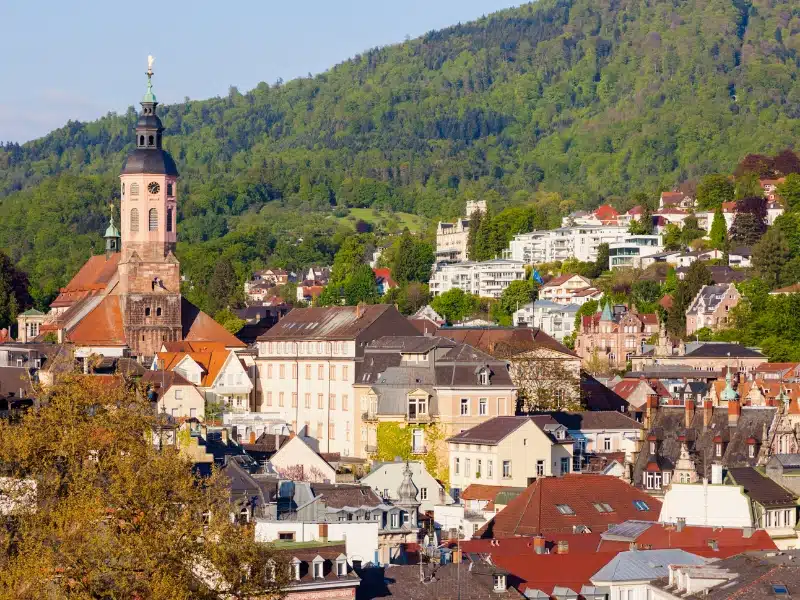
2. Görlitz – One of the best-preserved Old Towns in Germany
Görlitz, a charming city on the far eastern border of Germany, is an architectural powerhouse preserving centuries of European history. Its Old Town, also known as Altstadt, is a living museum, featuring a dazzling array of over 4,000 architectural structures spanning the Middle Ages to the Baroque period.
The picturesque cobblestone streets are lined with colorful houses, each telling its own unique tale. This cinematic backdrop has made Görlitz a favorite among filmmakers, earning it the nickname ‘Görliwood’.
The city’s unparalleled blend of history and charm is perfectly accompanied by the serene flow of the Lusatian Neisse River, making Görlitz one of the best places on this list of the most beautiful cities in Germany.
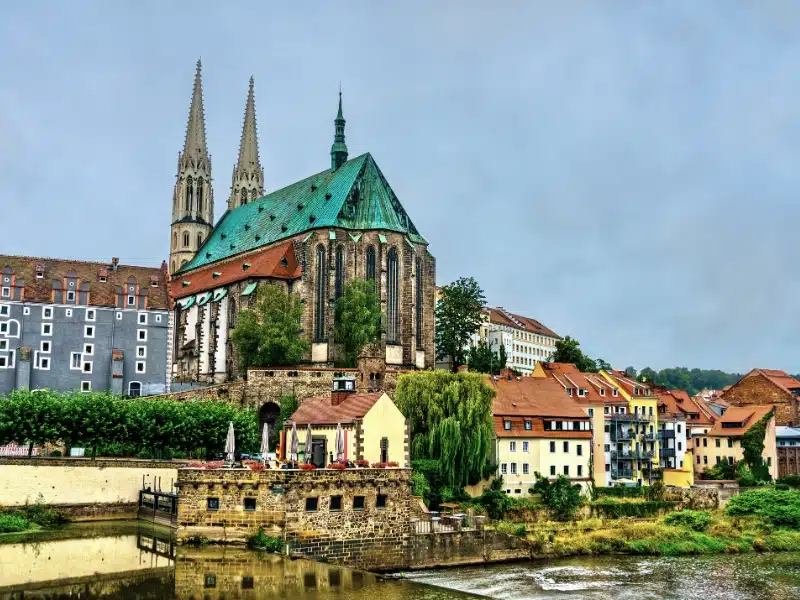
3. Freiburg im Breisgau
Nestled between the vibrant green hills of the Black Forest and the roughened slopes of Kaiserstuhl Mountain, Freiburg im Breisgau offers beauty at every turn.
Often called the ‘Jewel of the Black Forest’, this city is a mecca for nature enthusiasts, with its many vineyards, sunny weather, and an elaborate network of scenic biking and hiking trails.
The city center enchants with its Gothic Freiburg Minster, medieval gates, and picturesque cobblestone streets lined with cheerful, colorful buildings. Freiburg is an eco-conscious city and its commitment to sustainability is visible in its solar-paneled homes, abundant green spaces, and an efficient tram system.
The quintessential beauty of Freiburg im Breisgau is not just its physical charm but its harmonious fusion of nature with urban life, making it a standout amongst Germany’s most beautiful cities.
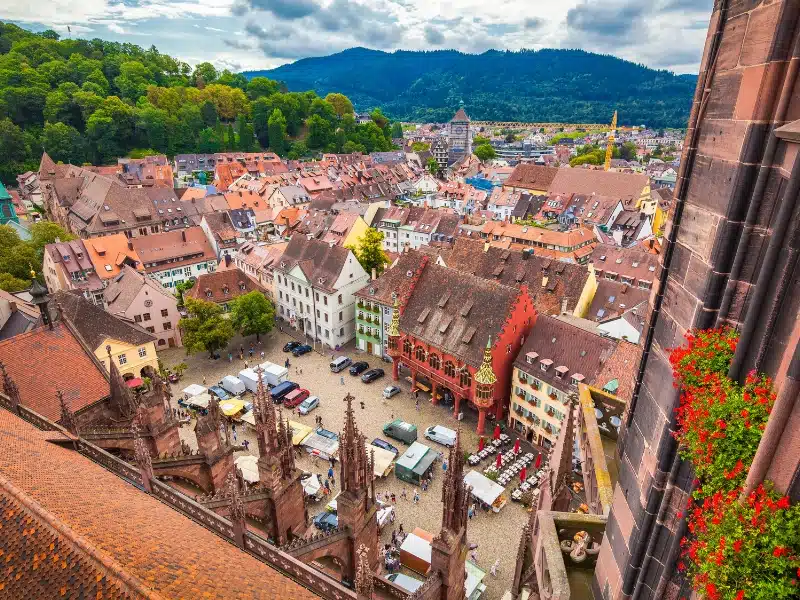
Make sure you have travel insurance you can trust when visiting Germany. We recommend True Traveller for their 5-star TrustPilot reviews, variety of cover options, best activities cover as standard, great prices, and excellent service.
4. Würzburg – The starting point of the Romantic Road
Würzburg, an enchanting city nestled along the Romantic Road in the northern Bavaria region, is a treasure trove of architectural grandeur and age-old vineyards. The city’s crown jewel, the Wurzburg Residenz, is a UNESCO World Heritage Site, boasting an impressive collection of Baroque art and lavish, intricate interiors.
Wander through Würzburg’s Old Town and you’ll find charming pedestrian streets lined with half-timbered houses, bustling markets, and inviting cafés.
A stroll across the iconic Old Main Bridge offers panoramic vistas of this picturesque city, making Würzburg an unforgettable stop on any tour of the top beautiful cities in Germany!
RELATED POST: Romantic Road Germany: Itinerary, Map & Tips
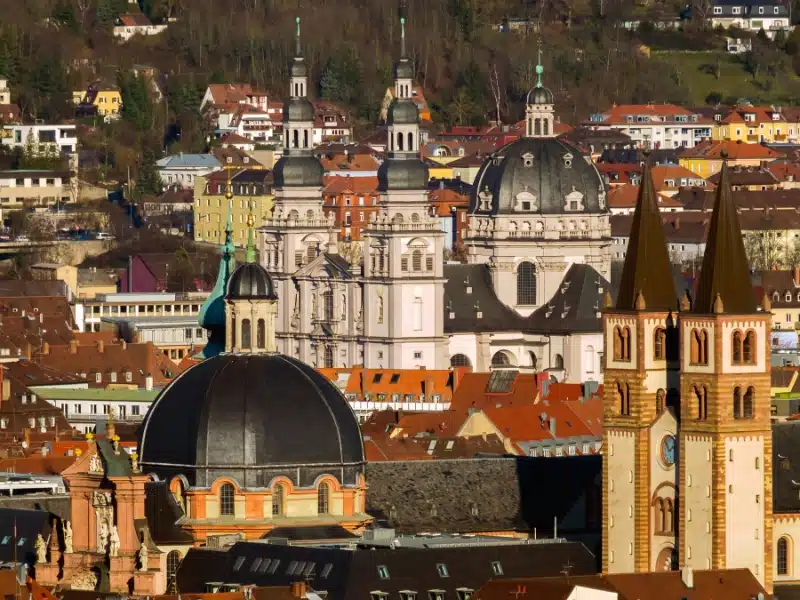
5. Regensburg
Regensburg, a timeless gem along the Danube River, is renowned for its well-preserved medieval core. The city brims with Gothic and Roman architecture, including the impressive St. Peter’s Cathedral that dominates the skyline with its towering spires.
The Old Town together with the Medieval village of Stadtamhof is a UNESCO World Heritage site and the charming labyrinth of narrow, winding alleyways lined with patrician houses dates back to the 13th century. A tour of the historic city would be incomplete without a visit to the iconic Stone Bridge and the ancient Porta Praetoria, remnants of the Roman fort.
Coupled with a vibrant selection of restaurants, bars, and boutiques, Regensburg enjoys a blend of historic charm and contemporary life, making it an unmissable part of Germany’s scenic tapestry.
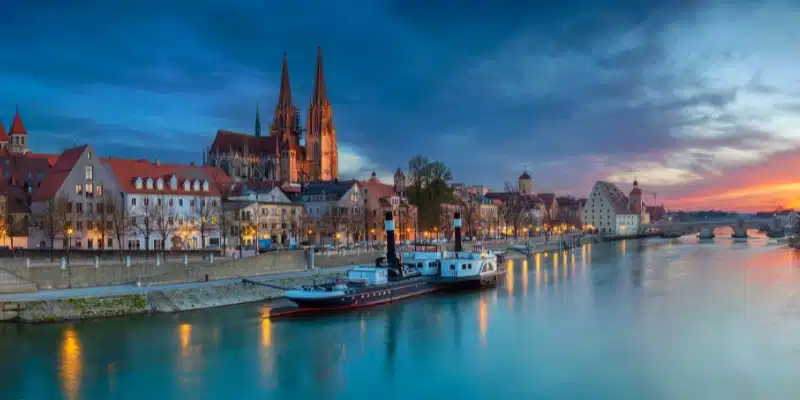
Looking for the best SIM card deals in Europe for your trip? Check out our guide to the best data SIMs in Europe and get the best deal for your trip to Germany.
6. Bremen
Bremen, a fairytale city in Northern Germany, is a delightful blend of medieval charm and cosmopolitan flair. The city’s heart, the Market Square, is framed by impressive architecture, such as the intricate Gothic Town Hall and the towering Bremen Cathedral, St. Petri Dom, both narrating centuries of history.
The iconic statue of the Town Musicians of Bremen, a tribute to the Brothers Grimm tale, adds a touch of whimsy to this UNESCO World Heritage site. Stroll through the narrow lanes of the Schnoor Quarter, the city’s oldest neighborhood, where tiny houses from the 14th century transport you back in time.
Meanwhile, the buzzing shops and cafés of the Viertel district reflect Bremen’s vibrant modern life. This harmonious mix of past and present makes Bremen a top contender on this list!
RELATED POST: Deutsche Märchenstraße: Germany’s Fairy Tale Road
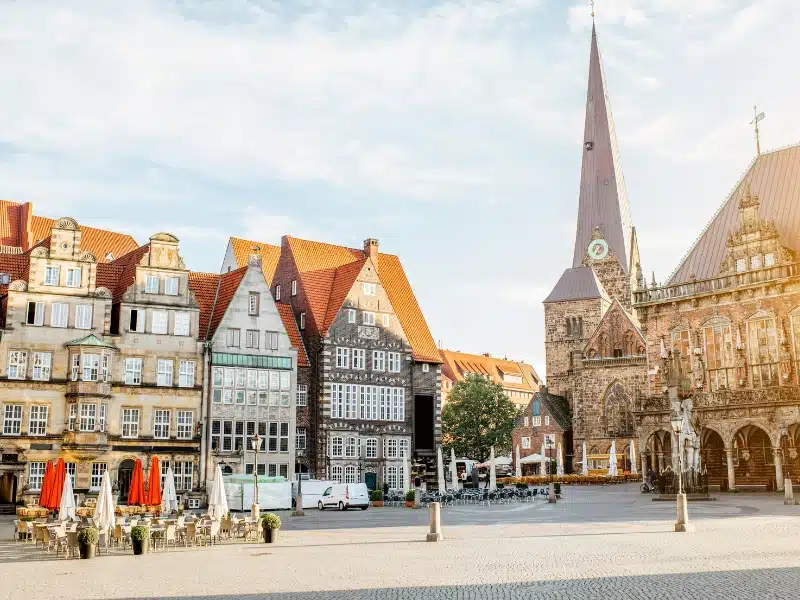
7. Darmstadt
Darmstadt, aptly known as the ‘City of Science’, is a unique combination of intellectual charm and architectural beauty nestled in the Hessen region of Germany. The city boasts the Mathildenhöhe, a hill brimming with Art Nouveau buildings that stand as evidence of the past’s artistic brilliance.
Darmstadt’s skyline is defined by the quirky yet stunning ‘Wedding Tower’, locally called the Hochzeitsturm, an architectural marvel that offers breathtaking panoramic views of the city.
The city’s vibrant cultural scene, enhanced by live music festivals and diverse museums like the Hessen State Museum, complements the city’s intellectual splendor. The lush green Herrngarten Park provides a touch of nature to this cityscape.
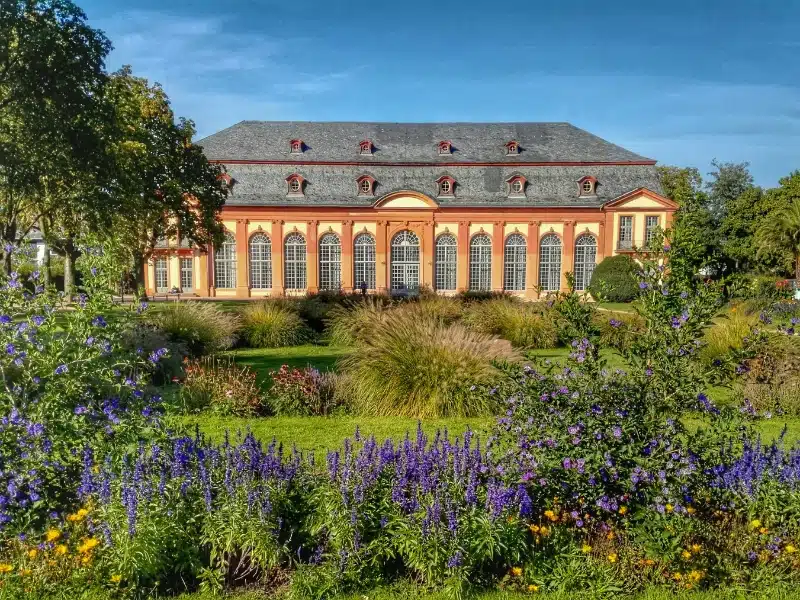
8. Nuremberg – Home to Germany’s largest Christmas Market
Nuremberg, a city steeped in history and tradition, is a captivating beauty in the heart of Bavaria and is recognized worldwide for its infamous Christkindlesmarkt, the largest Christmas Market in Germany.
Nuremberg was also the location of the Nuremberg Trials which took place after the Second World War, in which former Nazi leaders were indicted and tried as war criminals by the International Military Tribunal.
There is a lot to do in Nuremberg, as the medieval city walls and the Pegnitz River meander through the city, lined with historic bridges and picturesque views. Nuremberg’s fusion of rich history, vibrant culture, and festive spirit earn it a well-deserved spot on this list.
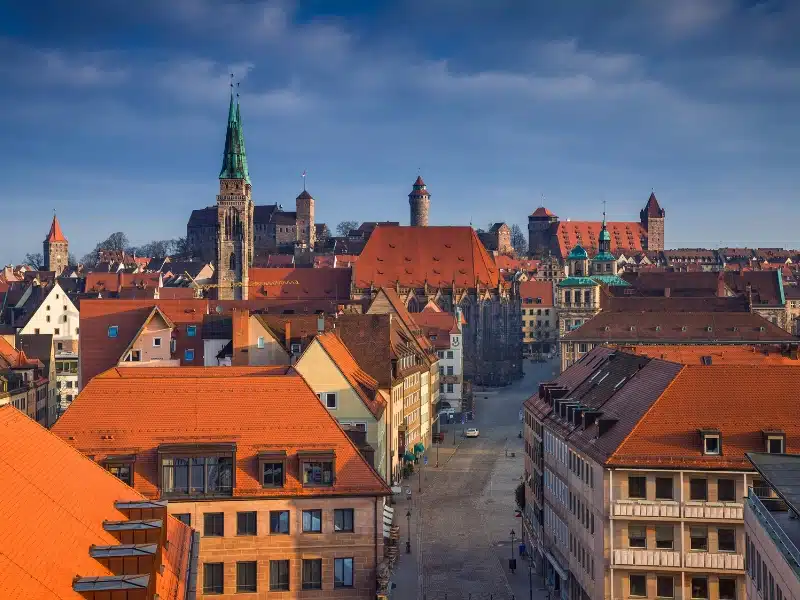
9. Munich
Munich, the capital of Bavaria, is a magnetic mix of historical charm and modern elegance. The city’s heart pulses around Marienplatz, a central square adorned with the neo-Gothic New Town Hall and the century-old Glockenspiel, officially known as the Rathaus-Glockenspiel, which delights onlookers with its daily musical performances.
Munich’s signature landmark, the Frauenkirche, graces the skyline with its towering and distinctive onion domes, while the opulent Nymphenburg Palace offers a glimpse into Bavaria’s regal past.
The city’s cosmopolitan flair is evident in its trendy boutiques, bustling beer gardens, and world-class museums such as the Alte Pinakothek. One of the oldest art galleries in the world, the museum houses a significant collection of Old Master paintings dating from the 14th to 18th centuries.
Surrounded by lush parks including the English Garden, one of the largest urban parks in the world, and the River Isar’s clear waters, Munich seamlessly blends urban life with nature, firmly cementing its place amongst the most beautiful cities in Germany.
RELATED POST: One Day Munich Itinerary + Map, Tips & Guide
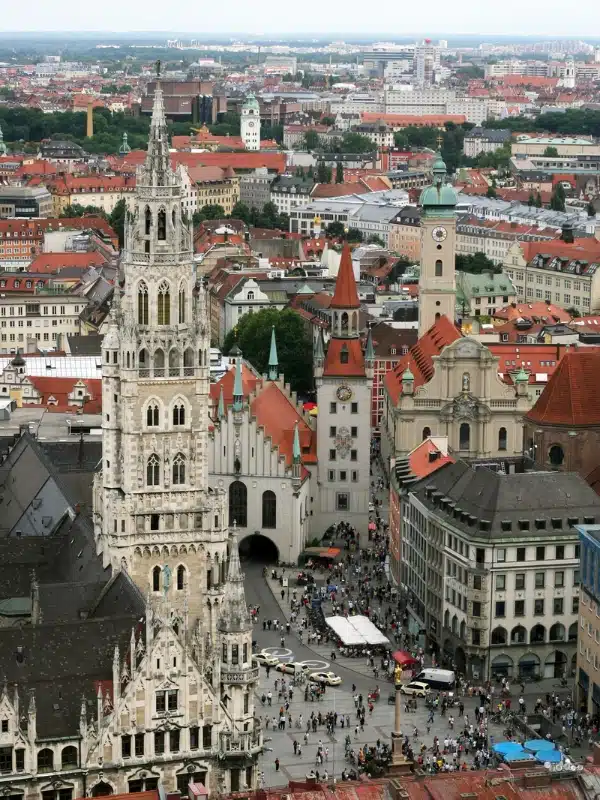
10. Augsburg – A beautiful Bavarian city
Augsburg, a gem just an hour’s drive northwest of Munich, is an architectural wonder steeped in rich history and breathtaking nature.
The city’s Altstadt is a gripping blend of Renaissance and Baroque architectures, boasting landmarks like the Augsburg Town Hall, a stunning example of Renaissance architecture, and the Fuggerei, the world’s oldest social housing complex that is actually still in use to this day.
The iconic Perlach Tower offers panoramic views of the city, while the Augsburg Eiskanal, an artificial whitewater river, introduces an adventurous edge to the city’s tranquil landscape.
Surrounded by charming canals and lush gardens, Augsburg’s mix of historical grandeur and natural beauty makes it one of Germany’s most captivating cities.
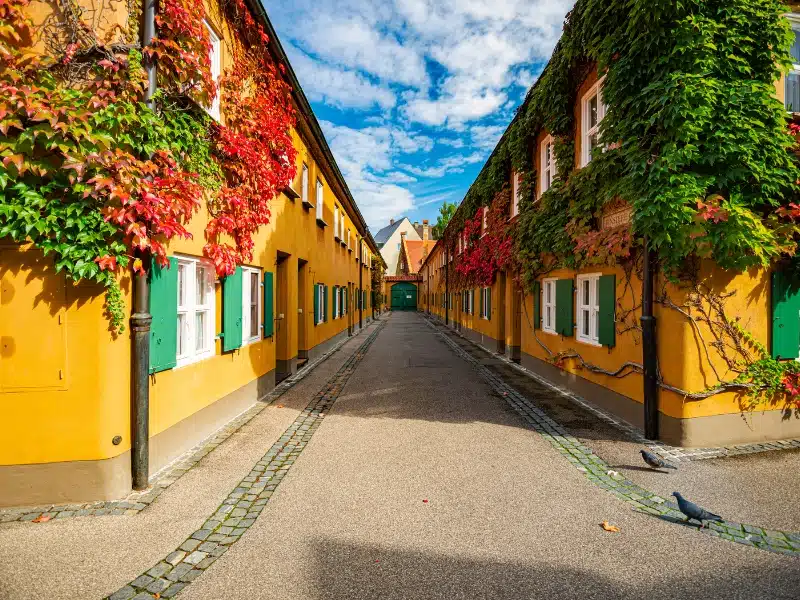
11. Düsseldorf
Moving on from our top 10 beautiful cities in Germany is Düsseldorf, the capital of North Rhine-Westphalia and an intriguing blend of contemporary dynamism and historic elegance.
The city’s old quarter is famously known for having one of the longest bars in the world with over 300 breweries serving the local Altbier, a top-fermented dark beer.
Königsallee, or ‘Kö’, is a shopping paradise adorned with designer boutiques and flagship stores. The Rhine River waterfront, with its iconic Gehry-designed Neuer Zollhof buildings, is the perfect place to admire the city’s architectural innovation.
Meanwhile, the tranquil Hofgarten Park and the vibrant Rhine River promenade highlight the city’s natural beauty.
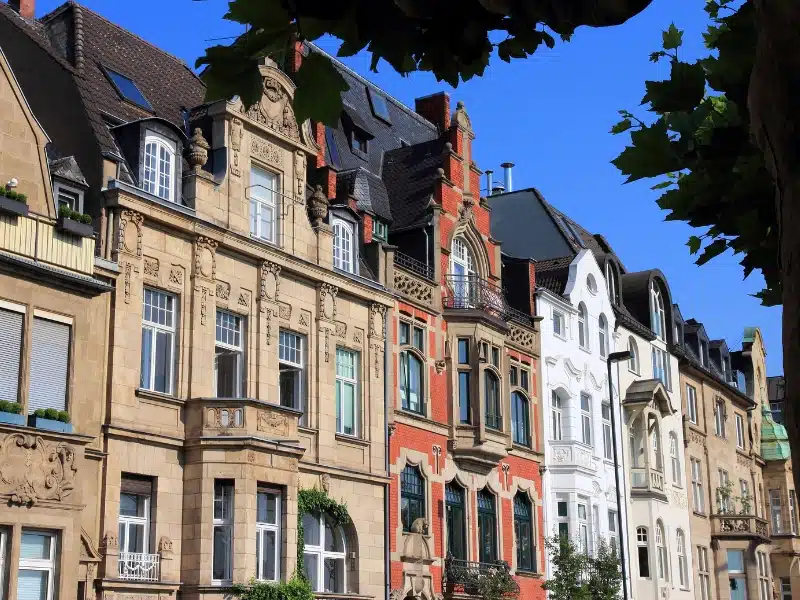
12. Heidelberg – Situated on the borders of the Black Forest
Heidelberg, perched on the edges of the enchanting Black Forest, is an exquisite combination of remarkable history, intellectual spirit, and natural splendor.
The city’s crowning glory is the Heidelberg Castle, a breathtaking Schloss that overlooks the old town and the serene Neckar River. Arriving by funicular to visit the mix of renovated buildings and ruins is a great way to start your visit to the city.
Heidelberg University is Germany’s oldest university, and together with the town’s bustling market squares, charming narrow lanes, Baroque buildings, and the iconic Old Bridge, Heidelberg enjoys plenty of historic charm.
Meanwhile, the Philosopher’s Walk on the northern banks of the river offers stunning panoramic views of the city and its surrounding countryside, offering unbeatable photo opportunities of the River Neckar.
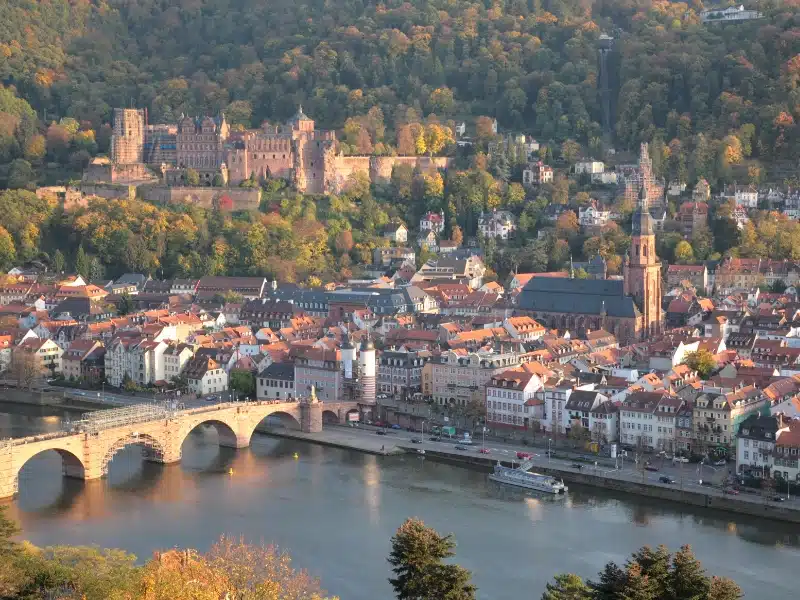
13. Hamburg
Hamburg, Germany’s second-largest city, is a stunning blend of traditional maritime charm and modern urban elegance. Anchored by the bustling Port of Hamburg on the River Elbe, one of the busiest ports in the world, the city’s rich Hanseatic maritime heritage is reflected in its historic waterfront district, Speicherstadt, with its towering red-brick warehouses.
The city’s beauty is further enhanced by the Alster Lake, around which the city sprawls, offering serene waterside views intermingled with bustling city life. The striking brick and glass Elbphilharmonie concert hall, an architectural masterpiece, adds a contemporary touch to the city’s skyline.
With its mixture of history, water elements, and vibrant city life, Hamburg is undeniably one of Germany’s most beautiful cities.
RELATED POST: 24 Hours in Hamburg – Itinerary, Map & Travel Tips
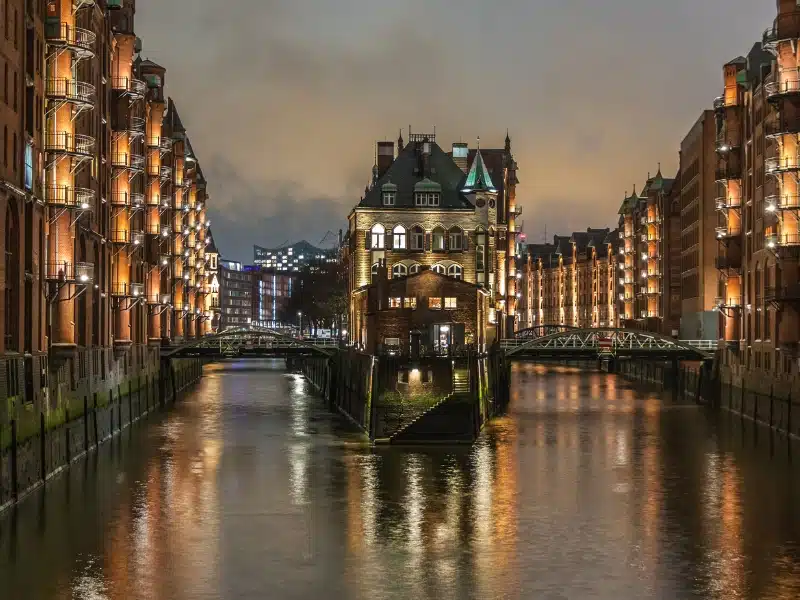
14. Trier – One of the most beautiful cities in Germany
Trier, Germany’s oldest city, is a treasure trove of ancient Roman architecture and medieval churches and is a great place from which to explore the scenic Moselle wine region.
The main attraction is the Porta Nigra, built during Roman times, which represents the most well-preserved city gate north of the Alps. Matched with the impressive Trier Cathedral, the city’s historic credentials are undeniable.
The enchanting Hauptmarkt Square with its colorful half-timbered houses and the Karl Marx House, the birthplace of the famous philosopher, enhance Trier’s cultural depth.
Surrounded by rolling vineyards and the tranquil Moselle River, it’s unsurprising that Trier is one of the top-visited destinations in Germany.
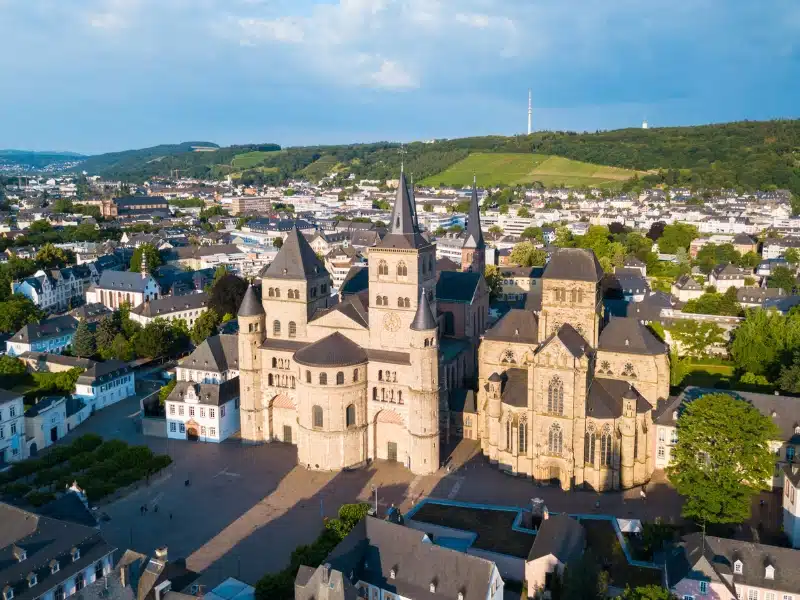
15. Osnabrück
Affectionately known as ‘the City of Peace’ due to the Peace of Westphalia treaties being signed here in 1648, this charming German city offers a blend of history and modernity nestled in the heart of Lower Saxony.
The city’s vibrant past echoes in its well-preserved medieval architecture, notably Osnabrück Castle, now the University of Osnabrück, and the stunning Romanesque St. Peter’s Cathedral, with its magnificent carvings and astronomical clock.
The city is equally progressive, boasting a lively cultural scene, trendy boutiques, and a bustling marketplace.
Located amidst rolling hills and intersected by the Hase River, Osnabrück’s balance of historical depth, urban vibrancy, and natural beauty make it a compelling addition to Germany’s most beautiful cities and very worth visiting.
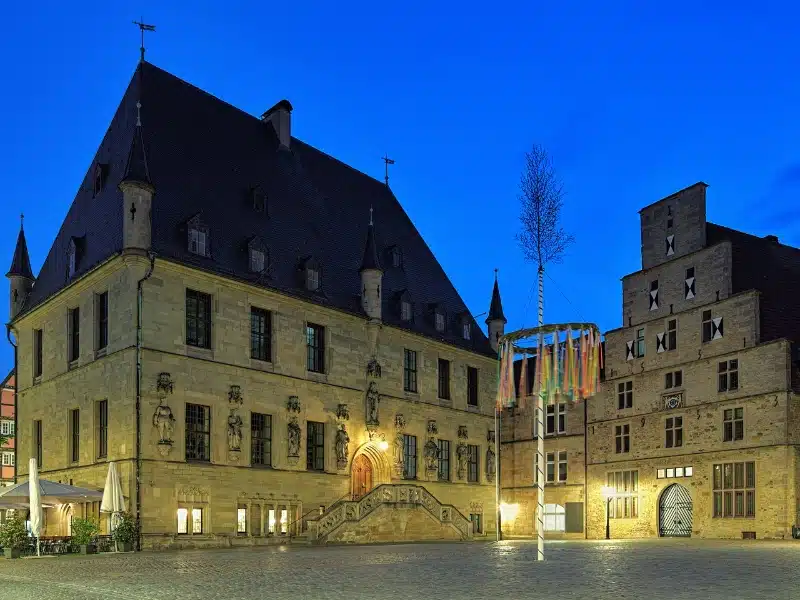
Other German Travel Ideas
16. Dresden – Home to one of the world’s oldest Christmas Markets
Also known as ‘Florence of the Elbe’, this city of remarkable beauty and cultural attractions is located in eastern Germany.
The Dresden cityscape is dominated by stunning architectural wonders such as the Frauenkirche, a symbol of the city’s post-war reconstruction, and the majestic Zwinger Palace, home to several world-renowned museums.
Then comes its iconic Christmas market, Striezelmarkt, one of the oldest in the world, where visitors can indulge in traditional German Christmas treats and gifts while surrounded by stunning Baroque architecture.
The historic Semperoper Opera House is at the centre of Dresden’s vibrant art scene alongside 50 museums, 60 art galleries and 36 theatres.
The Elbe River meanders through the city, with Brühl’s Terrace offering splendid views, rightfully earning Dresden recognition as one of the top beautiful cities in Germany.
RELATED POST: Discover the Magic: 32 of the Best Christmas Markets in Europe
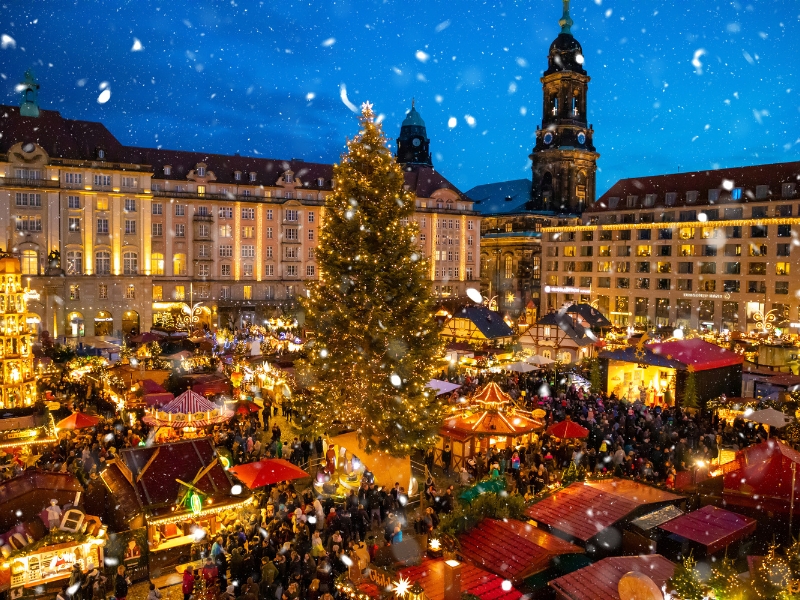
17. Leipzig
Home to one of Germany’s oldest universities, Leipzig is a vibrant, dynamic city packed with a rich tapestry of German history, culture, and stunning architecture.
Synonymous with the peaceful revolution and Monday Demonstations that led to the fall of the Berlin Wall, Leipzig’s historical significance is palpably felt in the streets surrounding the Nikolaikirche, St. Nicholas Church.
Leipzig’s love for music and arts is evident in the multitude of concert halls and galleries peppering the city, including the esteemed Leipzig Gewandhaus. Amidst the urban allure, the city is interspersed with tranquil green spaces, like the expansive Clara-Zetkin-Park and the Johannapark.
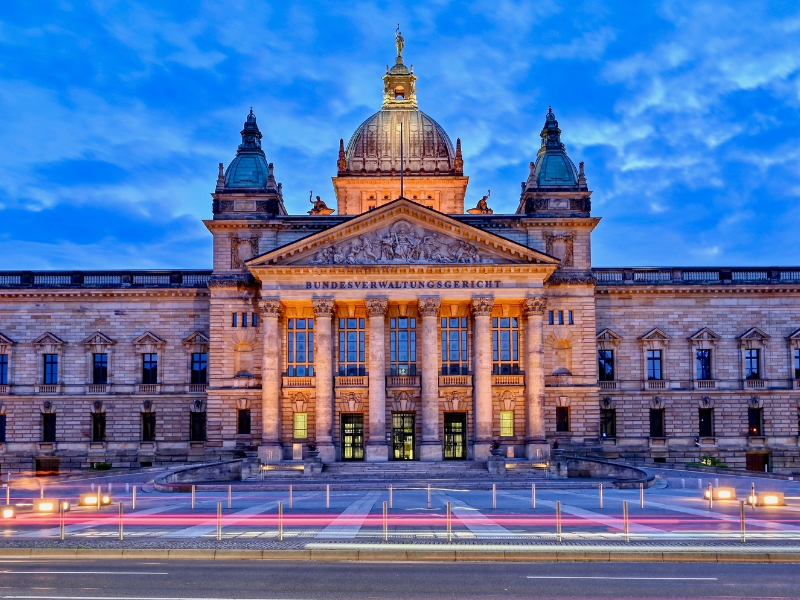
18. Rothenburg ob der Tauber
Rothenburg ob der Tauber is a picturesque gem tucked in the heart of Germany’s Franconia region on the Tauber River. This postcard-perfect medieval town seems plucked straight from a fairy tale, with its narrow streets lined by colorful, gabled houses and encircled by well-preserved medieval walls.
A popular stop on the Romantic Road, the small town’s charm is exemplified in the Marktplatz, where the stunning Town Hall and the historical St. George’s Fountain take center stage. A visit to the Medieval Crime and Justice Museum highlights the town’s dark yet intriguing past.
At night, the city transforms into a magical wonderland as it illuminates in warm light, making Rothenburg one of Germany’s most beautiful destinations.
RELATED POST: Six Unmissable Germany Road Trip Routes
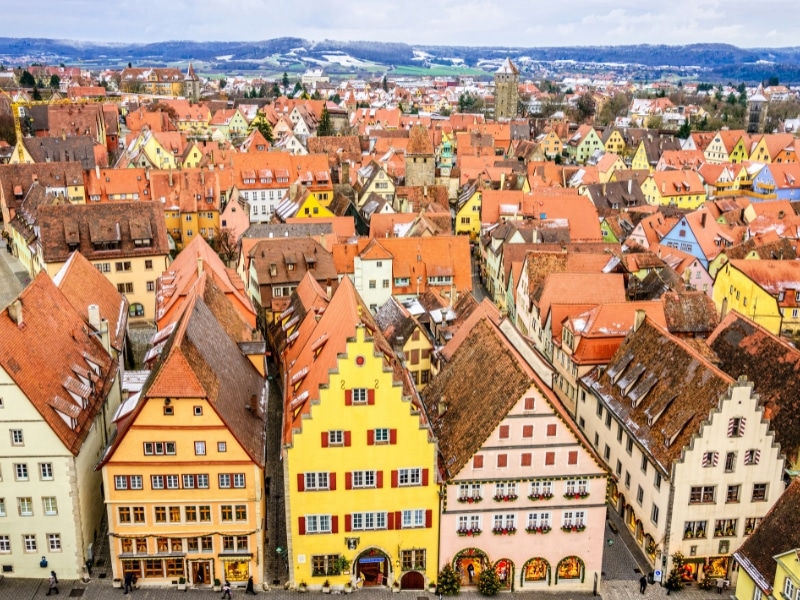
19. Lübeck
Lübeck is a pretty coastal city in northern Germany. It is best recognized for its distinctive Brick Gothic architecture, a testament to its status as the former capital of the Hanseatic League.
The city’s skyline is dominated by the seven church steeples, hence the name ‘City of Seven Spires,’. The towering spires including those of Lübeck Cathedral and St. Mary’s Church. Lübeck’s Old Town, a UNESCO World Heritage site, is an enchanting maze of winding alleys, where you’ll find the famed Holsten Gate.
Meanwhile, the Trave River adds a peaceful touch to the bustling cityscape, making Lübeck a truly charming destination.
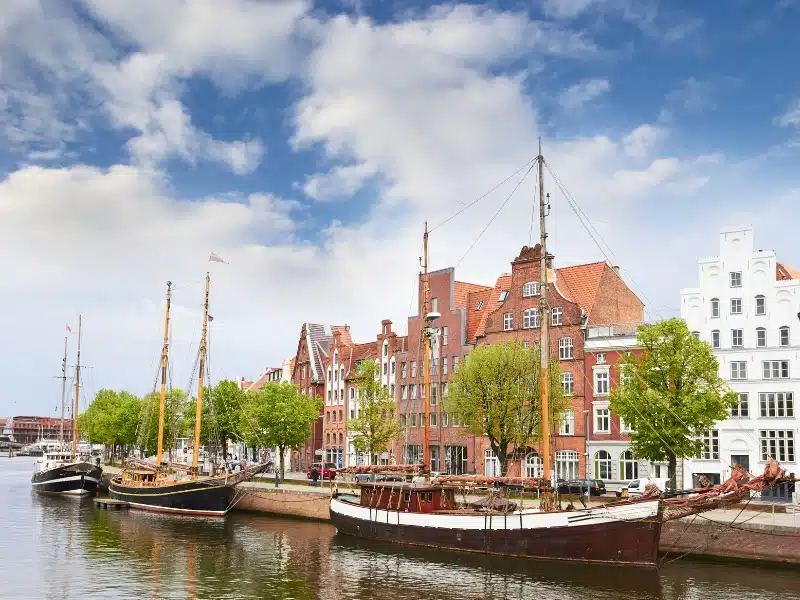
20. Berlin
Berlin, Germany’s bustling capital and the largest city in the country, effortlessly blends a rich historical tapestry with modern urban appeal. Its architectural diversity is captivating, with the majestic Brandenburg Gate, the poignant Memorial to the Murdered Jews of Europe, and the iconic Berlin Wall speaking volumes about the city’s past.
Berlin has a unique blend of history, culture, and cosmopolitan flair and the city’s vibrant arts scene is reflected in its numerous museums and galleries including the East Side Gallery, where some remnants of the Berlin Wall have been transformed into a canvas for thought-provoking artwork.
Museum Island is a UNESCO World Heritage site on Spreeinsel in the historic heart of the city and is one of the most visited sites of Germany’s capital and one of the most important museum sites in Europe. There are five museums of archaeology and art to visit: the Pergamon Museum; the Bode Museum; the Neues Museum; the Alte Nationalgalerie and the Altes Museum.
Meanwhile, the verdant Tiergarten offers a tranquil retreat amidst the city’s bustling heart and hosts Berlin Zoo and the Victory Column with its winged statue of Victoria, the Roman goddess of victory.
RELATED POST: Berlin in One Day – Itinerary, Map, Tips & Guide
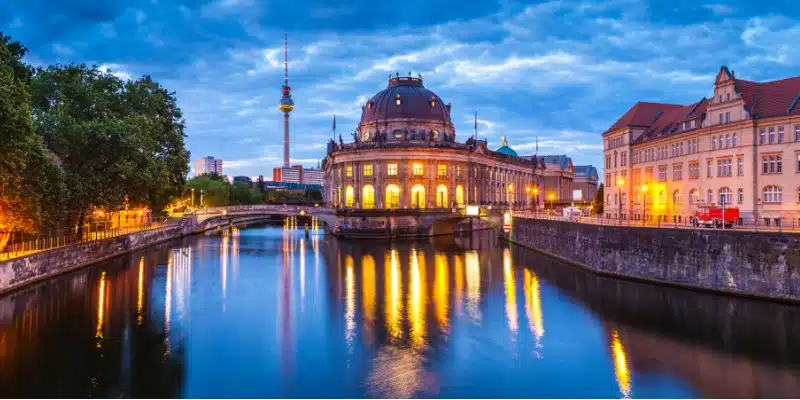
21. Schwangau- Home to the iconic Neuschwanstein Castle
Located in the Bavarian Alps, Schwangau is a quaint village that is home to the renowned Neuschwanstein Castle. This iconic castle, with its ethereal turrets and towers, appears to have sprung straight out of a storybook and captivates visitors with its stunning architecture and dramatic mountain backdrop.
Schwangau’s charm extends beyond the castle, with its lush, green landscapes, tranquil Alpine lakes, and the historic Hohenschwangau Castle.
The village’s unique blend of natural beauty, historical interest, and cultural richness make it an unforgettable addition to Germany’s most beautiful cities.
RELATED POST: 18 Magical Castles in Germany to Add to Your Bucket List
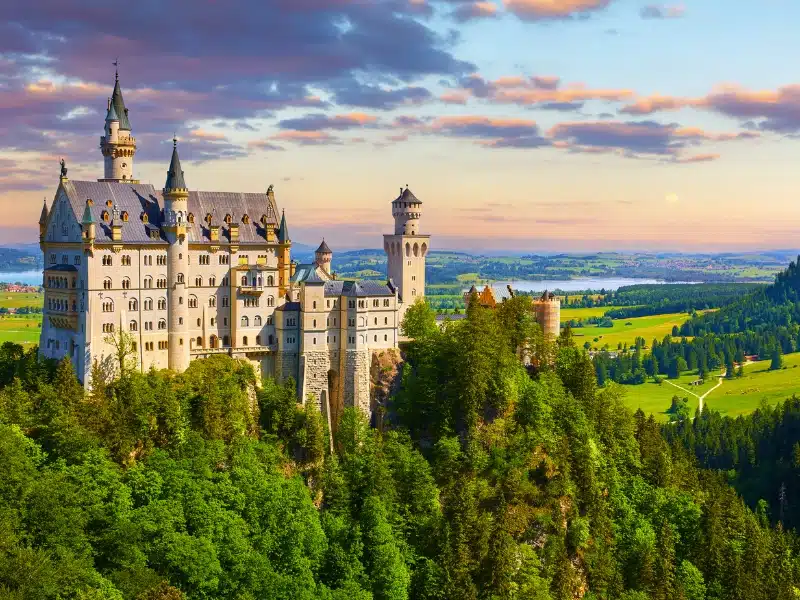
22. Cologne
Cologne’s defining landmark, the majestic Cologne Cathedral, pierces the skyline with its twin spires and is renowned as a masterpiece of Gothic architecture.
Beyond its historic charm, this great city welcomes visitors with a vibrant contemporary art scene, captivating museums like the Ludwig Museum, and the annual carnival festivities that fill its streets with color and energy every year.
The city, called Koln in German, gracefully straddles the banks of the River Rhine, with the charming Old Town offering photogenic views of quaint houses, historical buildings, and bustling squares.
Cologne’s blend of historic depth, cultural vibrancy, and scenic beauty truly distinguishes it as a gem among Germany’s cities.
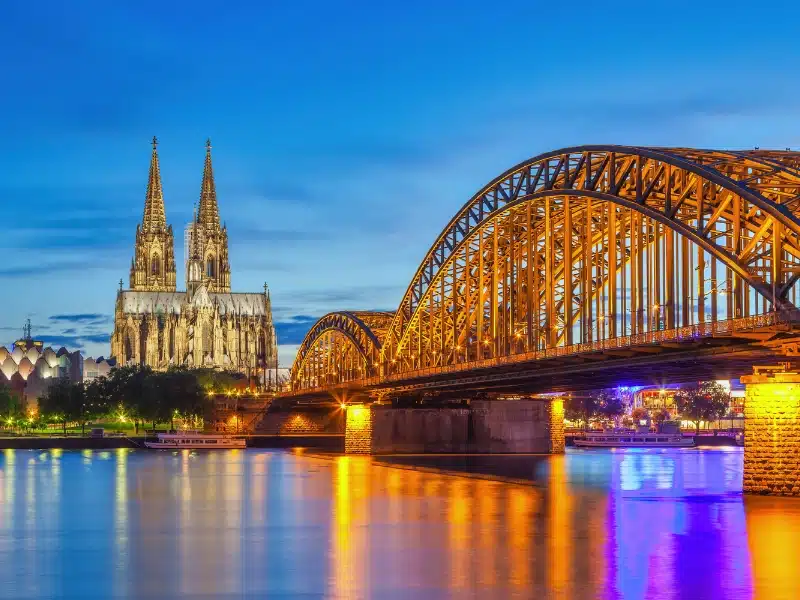
23. Rüdesheim am Rhein – A beautiful German city known for its winemaking
Rüdesheim am Rhein is a charming city nestled in the Rhine Valley, renowned for its winemaking tradition. This city is a spectacle of timber-framed houses, quaint cobbled streets, and picturesque vineyards that sprawl across the hilly landscapes.
The best way to enjoy the city is on the famed Drosselgasse, a lively pedestrian street that is the heartbeat of the city, buzzing with vibrant wine taverns and eateries. A ride in the Rüdesheim Cable Car offers panoramic views of the city, the majestic Rhine River, and the surrounding vineyards.
The city’s wine heritage is celebrated in the Rheingau Wine Museum located in the medieval Brömser Castle. With its stunning scenery and rich cultural heritage, Rüdesheim am Rhein truly stands as one of the most beautiful cities in Germany.
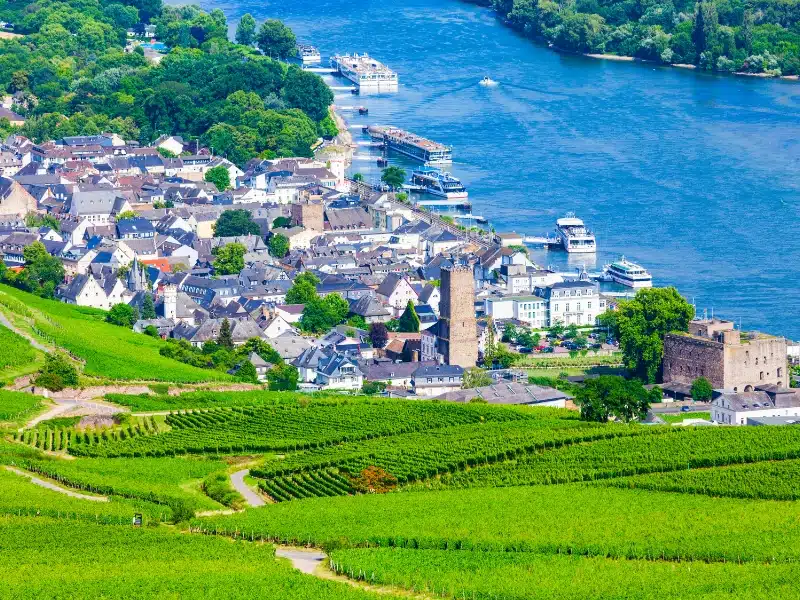
24. Mainz
Mainz, a city renowned for its old-world charm blended with a vibrant, modern energy, is a shining gem in Germany’s crown.
Its rich history is etched into every corner, from the medieval Mainz Cathedral standing proudly in the Market Square to the remnants of the Holy Roman Empire in the Roman Theater, which bears the marks of a bygone era.
It is thought that the printing press was invented in Mainz and the Gutenberg Museum highlights the invention and demonstrates the city’s important role in in global communications.
Yet, it’s not all history; Mainz is also a city of art and culture, reflected in its lively carnival traditions, eclectic culinary scene, and picturesque promenades along the beautiful Rhine River.
With its unique blend of old-world charm and contemporary vibrancy, Mainz is a city that truly has something for everyone.
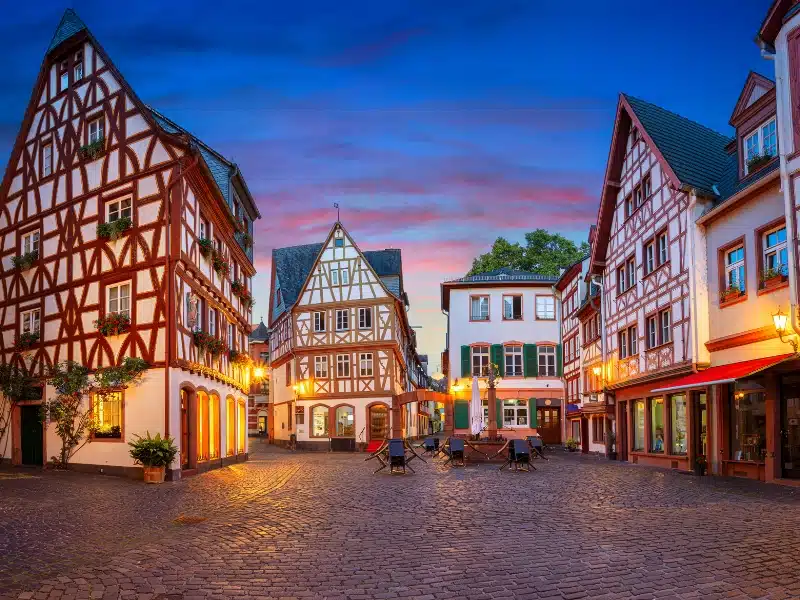
25. Münster
Münster, a dynamic city in Germany’s North Rhine-Westphalia region, is a delightful fusion of historic charm and youthful energy.
The city’s medieval architecture, exemplified in the stunning St. Paulus Dom and the 13th century Rathaus (Old City Hall) coexists harmoniously with a lively student culture courtesy of the University of Münster.
Tranquil parks and water bodies, including the serene Aasee Lake, add a touch of natural beauty, while the city’s commitment to sustainable living is evident in its bicycle-friendly roads and paths.
The Prinzipalmarkt, Münster’s central street is a hub of activity, lined with elegant gabled houses, boutiques, and elegant cafés offering visitors and locals a taste of the German kaffee und kuchen afternoon ritual.
With its blend of history, culture, and eco-consciousness, Münster proudly stands as one of Germany’s most beautiful and liveable cities.
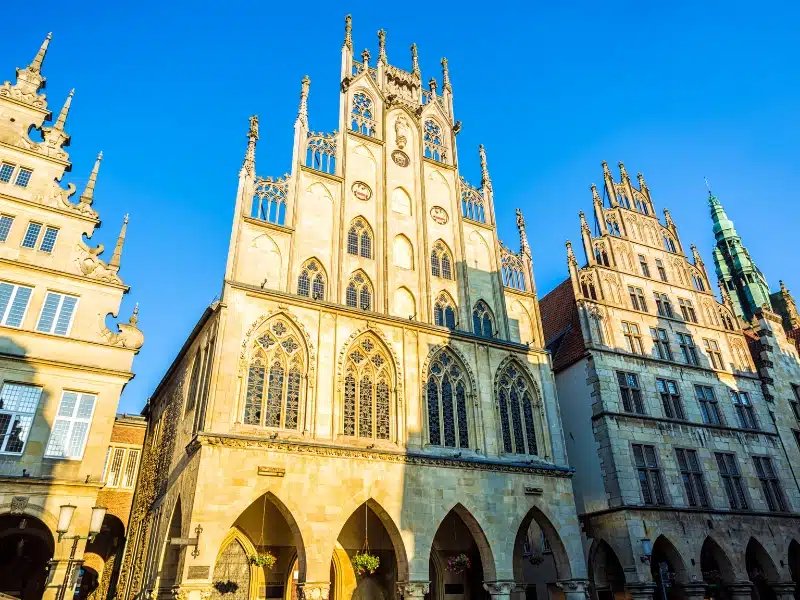
26. Stuttgart – A beautiful German city on the border of the Neckar River
Stuttgart is a mesmerizing blend of natural beauty and architectural magnificence. Its picturesque vineyard-lined hills provide the perfect backdrop to a cityscape dotted with architectural marvels.
Key among these is the Mercedes-Benz Museum, an attestation to Stuttgart’s significant role in automobile history, and the State Opera, a symbol of the city’s rich cultural heritage.
The breathtaking Wilhelma, one of the largest zoological-botanical gardens in Europe, adds a touch of vibrant diversity to the city.
Meanwhile, the bustling 1.2-kilometer Königstraße, lined with shops and eateries, gives a glimpse into the city’s lively spirit.
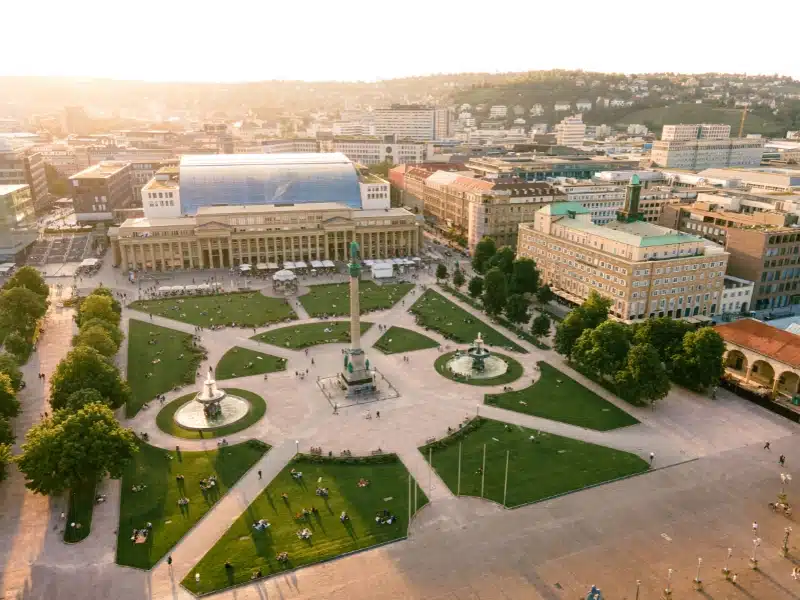
27. Rostock – One of the most overlooked beautiful cities in Germany
Possibly one of the most underated cities in Germany, Rostock is a city where maritime charm meets historical elegance.
This Hanseatic League city on the Baltic Sea boasts an array of captivating attractions, from the stunning Gothic architecture of St. Mary’s Church to the lively bustle of the city harbor, which offers a blend of fishing boats, cruise ships, and waterside dining that captures the city’s seafaring soul.
The picturesque Warnemünde Beach, with its lighthouse offering panoramic views, provides a serene getaway, while the vibrant botanical garden showcases the city’s natural beauty.
The city’s history is on full display at the Kloster zum Heiligen Kreuz, the Abbey of the Holy Cross, a 13th-century convent, and in the historic buildings and meticulous cobblestone streets of the old town.
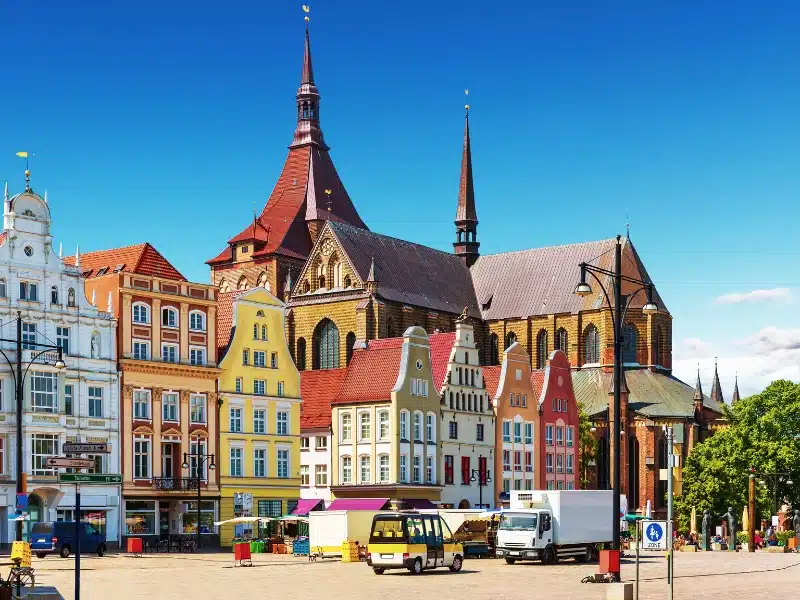
Most Beautiful Cities in Germany Map
How to use this map – Use your fingers (or computer mouse) to zoom in and out. Click or touch the icons to get more info about a place, and click the arrow in the box top left to open the index. To add to your own Google Maps account, click the star next to the title of the map.
FAQ: Beautiful Cities in Germany
In this section, I’ll be providing some useful information on Germany’s top cities, where you should visit first, and more!
What are the Main Cities in Germany?
Germany is home to several major cities, each with its own unique character and charm. Some of the main cities in Germany include:
What are the Best Cities in Germany to Live?
The best cities to live in Germany largely depend on an individual’s personal preference, but some cities often stand out due to their standard of living, infrastructure, healthcare, and overall quality of life.
Among these are Munich, known for its high standard of living, vibrant culture, and numerous employment opportunities. Hamburg, with its port city charm and robust infrastructure, is another preferred choice, especially for individuals inclined toward maritime lifestyles.
Meanwhile, Frankfurt’s international appeal, dynamic job market, and rich cultural life make it an attractive place to settle. On the other hand, smaller cities such as the university town of Heidelberg, and Freiburg im Breisgau offer a more relaxed lifestyle with picturesque landscapes and quaint charm.
Ultimately, it is important to research the different cities and decide which one best suits your needs and preferences.
What is the Prettiest German City?
While I would love to provide you with a top singular name of the #1 most beautiful city in Germany, this is a highly subjective choice and depends on personal preferences.
However, Heidelberg is often cited as one of the prettiest cities in Germany, with its historic sites including the beautifully preserved old town, the romantic Heidelberg Castle overlooking the Neckar River, and scenic surrounding hills. Its mix of Medieval and Renaissance architecture creates a picturesque environment that delights its visitors.
On the other hand, Rothenburg ob der Tauber is renowned for its well-preserved medieval old town making it a favorite among those who prefer a more historic charm.
Meanwhile, the vibrant city of Munich boasts stunning architecture, beautiful parks, and an array of cultural offerings, making it another contender for the title.
Which Part of Germany Should I Visit First?
Deciding where to visit first in Germany hinges on your personal interests, but if you’re enthralled by history and culture, start your journey in Berlin. Its vibrant art scene, historical sites, and dynamic nightlife will keep you entertained.
On the other hand, if your passion lies in medieval architecture and history, Nuremberg should be your first stop. The city is known for its well-preserved Medieval old town, the Imperial Castle, and the iconic Christkindlesmarkt, making it a great starting point for your German adventure.
Augsburg, the third oldest city in Germany, often fascinates with its Roman roots and the opulent Augsburg Town Hall. Lastly, the fashion and art hub of Düsseldorf, with its renowned shopping boulevard Königsallee, the modern Media Harbor, and the old town packed with traditional breweries, is a perfect city to experience the diversity of German culture.
What is the Best City to Go to in Germany?
When it comes to determining a particular order for your travels across Germany, it makes sense to plan your route with the best international airports and use train travel to get around from there. Start your trip in the big cities of Berlin, Munich, or Frankfurt as they are the busiest and most well-connected airports in Germany.
From there, it is up to your personal preferences and travel style. You can opt for a more metropolitan tour, hitting up cities like Hamburg, Cologne, and Düsseldorf.
Alternatively, you could explore the quaint charm of smaller cities such as Heidelberg, Rothenburg ob der Tauber, and Freiburg im Breisgau.
What is the Most Modern City in Germany?
Frankfurt is widely recognized as the most modern city in Germany. Characterized by its futuristic skyline dominated by high-rise buildings, it has a unique architectural blend of old and new. From personal experience, unless you’re standing in the center of the Old Town, you could be fooled into thinking you’re in another city elsewhere around the world.
Frankfurt is known as the financial hub of Germany, hosting the European Central Bank and numerous international financial institutions. Its airport is one of the world’s busiest, further emphasizing the city’s modern and international appeal.
As a center for education, innovation, and trade fairs, Frankfurt continuously evolves, maintaining its status as Germany’s most modern city.
Conclusion
One of the best things about the beautiful country of Germany is its diverse range of cities, each with its own unique charm and appeal. Whether you prefer a bustling metropolitan lifestyle or a more relaxed atmosphere, there is a city in Germany that will suit your needs and preferences. So, pack your bags and get ready to explore the most beautiful cities in Germany!
Looking for Europe more travel inspiration? Check out these top posts…
Edinburgh in Autumn: Weather, Where to Go & What to Pack
London in Autumn: Weather, Where to Go & What to Pack
Scottish Highlands: 15 Most Gorgeous Places to Visit
Scotland in Autumn: Ultimate Travel Guide
Autumn in the UK: 27 Stunning Places
Paris in the Fall: Ultimate Travel Guide
Love it? Pin it!
